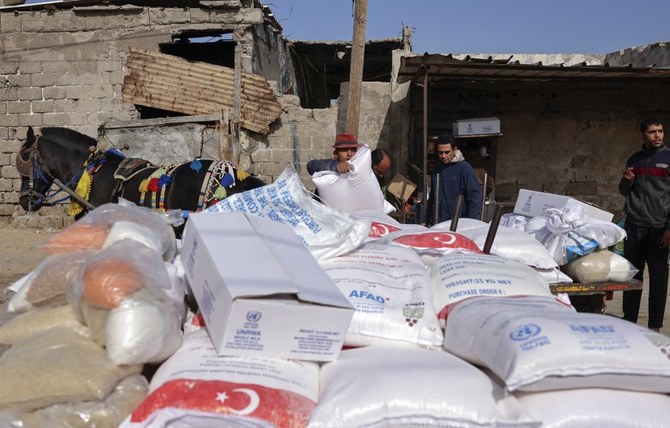
- ARAB NEWS
- 06 Jul 2025

RAMALLAH: The Palestinian Authority’s ties with the EU have become strained following the European bloc’s suspension of financial support for several Palestinian projects over the past 15 months.
The EU has tied the aid to the removal of some material from Palestinian textbooks and a halt to the payment of salaries to Palestinian prisoners, Palestinian officials told Arab News in Ramallah.
The PA sent a high-level delegation to Brussels to persuade EU member countries to resume the aid. The authority said it almost managed to overcome obstacles with the EU approval of $94 million for the UN Relief and Works Agency for Palestine Refugees (UNRWA), $149 million for the PA budget and $88.5 million for the PA development projects.
“There is only one country, Hungary, out of 27 EU countries that opposed the financial support for the PA. In the end, they will find a solution, and the support may be delayed, but it will not stop,” a senior PA official, who requested anonymity, told Arab News in Ramallah.
The EU is widely considered to be the most prominent supporter of the PA, with an annual aid transfer of $265 million that covers 80 percent of the salaries of the PA’s 140,000 employees in the civil and security sectors.
The problem arose about 15 months ago when the EU suspended its aid and requested the authority change some content in school textbooks that Israel considers anti-semitic and instances of racial incitement. The EU also asked the PA to stop paying salaries to hundreds of Palestinian security prisoners in Israeli jails. The PA rejected the request.
“Hungary’s relationship with Israel is good, so they are trying to blackmail us by dictating Israeli conditions, such as changing the curricula and stopping the payment of salaries to prisoners, but the Palestinians do not need to incite against Israel through school books,” the PA senior official told Arab News.
With the complete cessation of the aid provided by Arab countries and the US, the PA relies entirely on tax funds collected by Israel on its behalf, which it transfers to the authority every month, and on local taxes, which combined provide a total of $277 million. Its monthly salary bill is $293 million. Over the last three months, the PA has been unable to pay full salaries to its employees, who have received just 80 percent of their pay.
Meanwhile, Israeli media reports suggested that the EU has recently adopted a firm attitude against the PA, but both Palestinian and European sources denied it, terming the news “Israeli wishes.”
“For anyone following this … (the) report is seriously misinformed. Oliver Varhelyi’s (a Hungarian representative and the EU commissioner for neighborhood and enlargement) proposal for conditionality failed to pass,” Martin Konecny, chief of the European Middle East Project, an independent civil society hub in Brussels, tweeted on March 16.
The Palestinians claim that Israel wants to remove textbook content that accurately reflects the Palestinian narrative, which is based on an accurate history of the conflict.
They allege that the EU’s demands cannot be followed because the bloc does not monitor the Israeli school curricula, which is full of incitement against the Palestinians.
“In the absence of an actual peace process and the lack of control over the Israeli curricula, asking the Palestinian side to remove its narrative is unacceptable, especially since the Palestinian curricula do not include incitement to terrorism or talk about the right of return or a contradiction with the spirit of the Oslo Peace Agreement,” Samir Hulileh, Palestine’s former deputy economy minister, told Arab News.
The people most-affected by the European aid drop are 115,000 low-income families in the West Bank and Gaza Strip who rely on a monthly salary of $231 or less. They have not been paid what they are owed for the past five months as the PA could not find an alternative source for those payments, Palestinian sources claimed,
“The PA budget, UNRWA, and development projects can wait for a while, but the low-income families cannot. The EU should not have suspended all aid absolutely but rather excluded the aid provided to this poor group in Palestinian society,” Hulileh said.
The EU funding announcement comes as the PA continues to battle with its biggest challenge: a fiscal deficit of $61 million per month.
The struggle has been worsened by a significant decline in international aid. In 2011, the volume of foreign assistance provided to the PA amounted to $1.7 billion, but by 2021, it had dropped to $186 million.